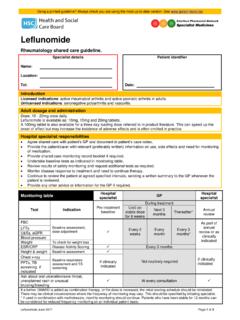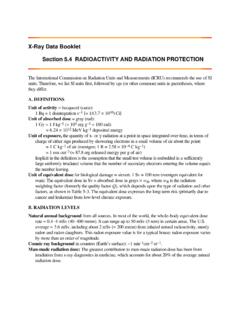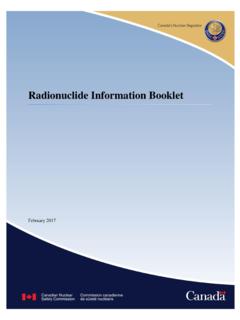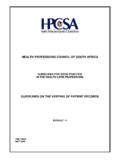Transcription of Azathioprine (non-transplant indications) - IPNSM
1 Azathioprine adult (non- transplant indications ) June 2017 Page 1 of 3 Using a printed guideline? Always check you are using the most up to date version. See Azathioprine (non- transplant indications ) Dermatology / Gastroenterology / Haematology / Neurology / Respiratory / Rheumatology / Immunology / Ophthalmology shared care guideline. Specialist details Patient identifier Name: Location: Tel: Date: Introduction Licensed indications : Crohn s disease, ulcerative colitis, systemic lupus erythematosus, dermatomyositis, polymyositis, autoimmune chronic active hepatitis, pemphigus vulgaris, polyarteritis nodosa, auto-immune haemolytic anaemia, chronic refractory idiopathic thrombocytopenic purpura (ITP), severe rheumatoid arthritis.
2 Unlicensed indications : Dermatological indications : atopic dermatitis, bullous pemphigoid, chronic actinic dermatitis, pyoderma gangrenosum, chronic spontaneous urticarial, angioedema, urticarial vasculitis. Systemic vasculitis eg. granulomatosis with polyangiitis (GPA: formerly Wegener s granulomatosis), microscopic polyangiitis (MPA), giant cell arteritis, Takayasu s arteritis, eosinophilic granulomatosis with polyangiitis (formerly Churg Strauss syndrome). Other: sarcoidosis, granulomatous lymphocytic infiltrative lung disease, myasthenia gravis, inflammatory eye disease. Adult dosage and administration Dosage regimens may vary between - 3mg/kg daily specific to the patient and the condition.
3 Dosage may need to be reduced in patients with renal and/or mild to moderate hepatic impairment. Preparations available: Azathioprine 25mg, 50mg tablets. Hospital specialist responsibilities Assess if the patient is suitable for treatment with Azathioprine . Agree shared care with patient s GP and document in patient s case notes. Provide the patient/carer with relevant (preferably written) information on use, side effects and need for monitoring of medication. Provide shared care monitoring record booklet if required. Undertake baseline tests as indicated in the monitoring table. Review results of safety monitoring and request additional tests as required. Monitor disease response to treatment and need to continue therapy.
4 Continue to review the patient at agreed specified intervals, sending a written summary to the GP whenever the patient is reviewed. Provide any other advice or information for the GP if required. Azathioprine adult (non- transplant indications ) June 2017 Page 2 of 3 Monitoring table Hospital specialist GP Hospital specialist Test Indication Pre-treatment baseline During treatment Annual review Until on stable dose for 6 weeks Next 3 months Thereafter FBC Baseline assessment, dose adjustment Every 2 weeks Every month Every 3 months As part of annual review or as clinically indicated LFTs U&Es, eGFR ESR/CRP (Rheumatology and Gastroenterology only) Disease activity scoring Every 3 months Height & weight Baseline assessment Not routinely required If clinically indicated Blood pressure Baseline assessment, respiratory and TB screening If clinically indicated Chest x-ray PFTs, TB screening if indicated Urinalysis To assess for renal disease (proteinuria) or infection TPMT To assess suitability for treatment Ask about oral ulceration, sore throat, unexplained rash or unusual bruising/bleeding At every consultation If a further DMARD is added as combination therapy, or the dose is increased, the initial starting schedule should be reinstated.
5 There may be clinical circumstances where the frequency of monitoring may vary and this should be specified by the initiating specialist. GP responsibilities Prescribe Azathioprine . Arrange and record ongoing monitoring as advised by specialist (see monitoring table), ensuring practice systems are in place to recall patients for monitoring blood tests. Prevent ongoing prescription if patient is not compliant with monitoring. Liaise with specialist if appropriate. Report any adverse drug reactions to the initiating specialist and the usual bodies (eg. MHRA/CHM). Ensure no drug interactions with other medicines. Administer inactivated influenza vaccine annually unless otherwise advised by the initiating specialist.
6 Check patient has had ONE DOSE of pneumococcal vaccine (revaccination is not recommended except every five years in patients whose antibody levels are likely to have declined more rapidly eg. asplenia), see BNF or Green Book. Passive immunization using varicella immunoglobulin (VZIG) should be considered in non-immune patients if exposed to chickenpox or shingles. Contact Regional Virus Laboratory, Royal Group of Hospitals, duty virologist 07889 086 946 for advice if exposure is suspected. For other queries eg. those concerning exposure, infection or any recommendations relating to healthy susceptible household contacts, consult the Green Book and/or take additional advice from Regional Virus Laboratory, Royal Group of Hospitals.
7 Ask about oral ulceration, sore throat, unexplained rash or unusual bruising/bleeding at every consultation. Azathioprine adult (non- transplant indications ) June 2017 Page 3 of 3 Withhold Azathioprine and contact specialist if: WCC < x 109/L Neutrophils < x 109/L Unexplained eosinophilia > x 109/L Platelets < 140 x 109/L MCV > 105fL, (check B12 & folate & TFT) AST/ALT > 3 times the upper limit of normal (for results between 2 - 3 x ULN, continue Azathioprine , repeat bloods and seek specialist advice). Minor elevations of AST/ALT are common If renal impairment develops Unexplained fall in serum albumin Oral ulceration / sore throat Unexplained rash / abnormal bruising New or increasing dyspnoea or dry cough.
8 Normal reference range may vary slightly between labs. Results should be recorded in the patient s shared care monitoring record booklet (where in use). Please note an unusual fall or rise or a consistent downward or upward trend in any value should prompt review of the patient and extra vigilance. Some patients may have abnormal baseline values, specialist will advise. Adverse effects, precautions and contraindications General signs of malaise such as dizziness, diarrhoea, rash, myalgia and arthralgia occur infrequently. If severe or persistent refer to initiating specialist. Renal impairment. Caution is advised regarding adequacy of renal function if Azathioprine is to be used concomitantly with NSAIDs, ACE inhibitors or angiotensin II antagonists.
9 Infection. Immunosuppressants can increase susceptibility to infection. It is advisable not to commence or continue treatment with Azathioprine when patients have a confirmed or established local or systemic infection. It is advisable to recommence once the infection has been treated. Precise period of discontinuation depends on the nature and severity of infection and the activity of the underlying disease. Nausea can occur initially but can be reduced by taking the tablets after food. Blood disorders: leucopenia, anaemia and thrombocytopenia. GPs should be alert to any oral ulceration, sore throat, unexplained rash or abnormal bruising/bleeding. Pancreatitis has been reported in a small percentage of patients.
10 Pregnancy / contraception. Women of childbearing potential and men receiving Azathioprine should be advised to use effective contraception. Patients discovered or planning to become pregnant should be referred to the initiating specialist at the earliest opportunity without discontinuing Azathioprine . Breastfeeding. Women being treated with Azathioprine should seek specialist advice. Cancer risk. Patients receiving long-term immunosuppressive drugs are at increased risk of developing a malignancy. The most frequently occurring types are lymphoma and skin malignancy. The avoidance of excessive exposure to the sun, and the use of high factor sunscreen and protective clothing are advised.








